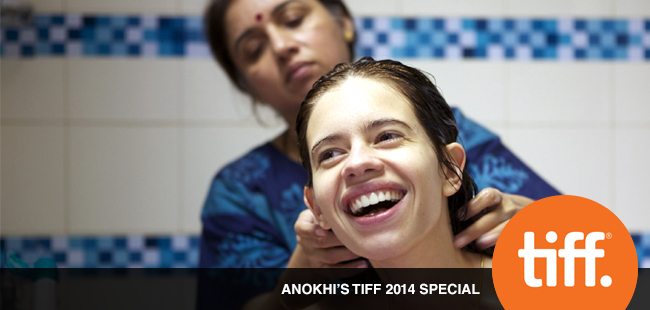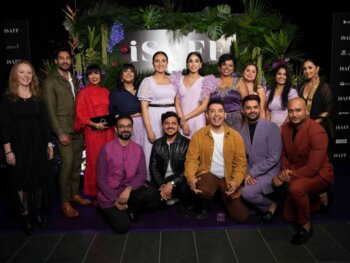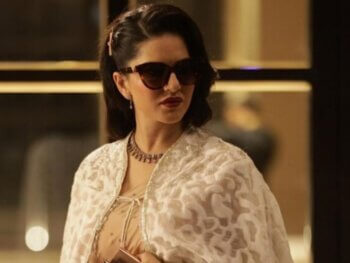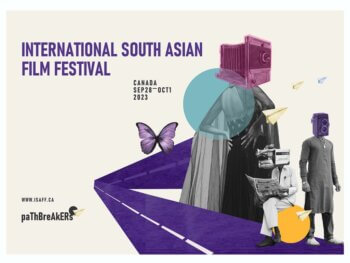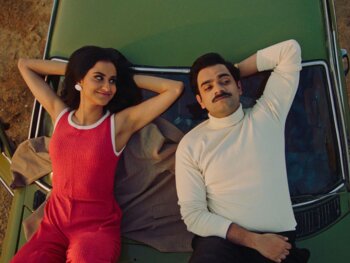Kalki Koechlin discusses her brave performance in Margarita, With a Straw.
Margarita, With a Straw debuted early this week and immediately put itself in the conversation about this year’s top South Asian TIFF entry. Kalki Koechlin (Also in another TIFF fave: That Girl in Yellow Boots) stars as Laila, a young Indian musician with debilitating cerebral palsy. She heads to New York to find her place in the world. Once there, it’s not long before she meets a passionate blind activist (Sayani Gupta), and a life-changing romance begins.
I spoke with Koechlin, after the premiere, about her months spent retraining her body to accurately depict cerebral palsy and getting audiences to see beyond a disability to the rich character underneath.
Kalki Koechlin with Arts & Entertainment Editor, Matthew Currie/ Aaranan Sooriyamoorthy
Matthew Currie: So, how did you come to be involved with this film?
Kalki Koechlin: Shonali [Bose] sent me the script and I liked it. I thought, 'I'm never gonna get a role like this again in my life.' I was extremely nervous about it. It's a pretty vulnerable thing to do. And to represent [cerebral palsy] correctly. It was scary, but it gave me goosebumps in an exciting way. I told Shonali I would need six to eight months, just for preparation.
MC: What kind of preparation, exactly?
KK: Lots of things. One was, of course, Shonali's cousin, who has cerebral palsy. Shonali introduced me to [her] and she just opened herself up to me. I lived with her, I went out with her, we got drunk together, went to movies together. And I really observed everything about how she was physically, how other people treated her. Especially in India, where people are not really aware of disabilities. They would be really patronizing to her. I mean, she's got an MA, she's written a book, she's lived everywhere in the world, and yet they're like, 'Hello, darling!' She's 40 years old, yet they treat her like a child. The frustrations of all that, and yet she's the most positive person. I mean, she puts able bodies to shame.
Apart from that, I worked with her speech therapist and her physiotherapist to understand what happens to the body. Basically, the brain is not coordinating properly with the muscles. And the tricky thing with cerebral palsy is that no person with CP has the same thing. Everyone is different, so you can't just imitate one person. You have to find it for yourself.
MC: Which aspect of your character’s personality did you connect with the most?
KK: Well, I think one of the big reasons Shonali got me was because of my smile. She said, 'You've got that smile, that's very Laila.' And what she meant was, Laila has a certain innocence about her. Even though she keeps getting knocked down over and over, she just bounces back up with a joke or a smile. I don't know what it is, but I look a lot younger than I am, and I also behave a lot younger than I am. Like, I'm not very mature [laughs]. I don't behave like a lady; I'm quite "la-di-dah," be myself and stuff like that. That's something I felt I could relate to with Laila.
MC: So last night was the first time you saw the film. What'd you think?
KK: Yeah, I enjoyed it. Of course, I'm highly self-critical. There's hundreds of things where I thought, 'Damn, I needed to do this,' or whatever. But it worked as a film for me, and it makes you laugh and cry. And most of all it makes you forget about the disability. You see the person behind it. And it's the same thing with the issue of sexuality, or bisexuality – they're not issues that are being addressed in the film – they're just by proxy. It's not a big deal if somebody is gay or disabled; just get over it! That’s the attitude of this film.
Matthew Currie
Author
A long-standing entertainment journalist, Currie is a graduate of the Professional Writing program at Toronto’s York University. He has spent the past number of years working as a freelancer for ANOKHI and for diverse publications such as Sharp, TV Week, CAA’s Westworld and BC Business. Currie ...


















































